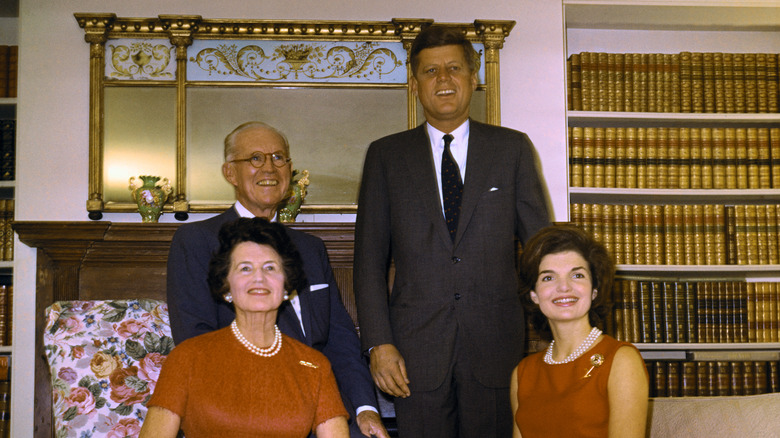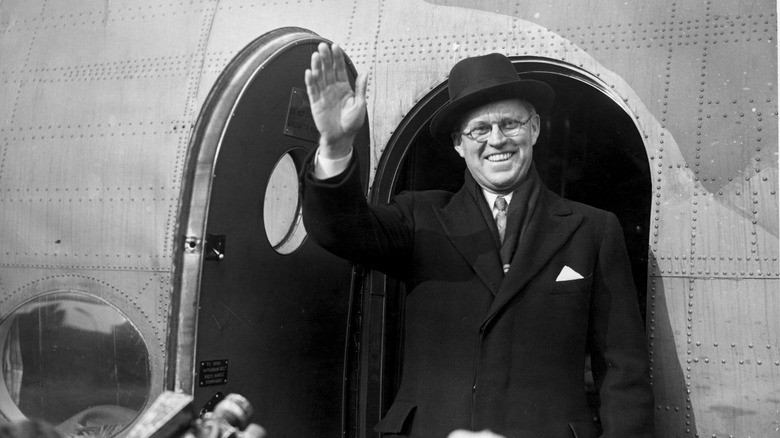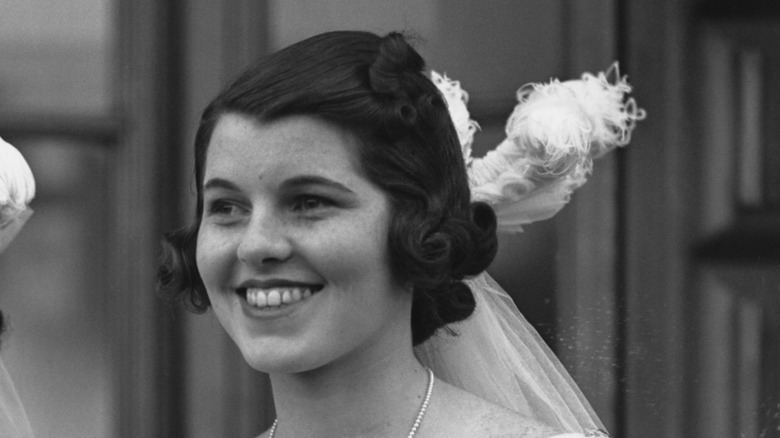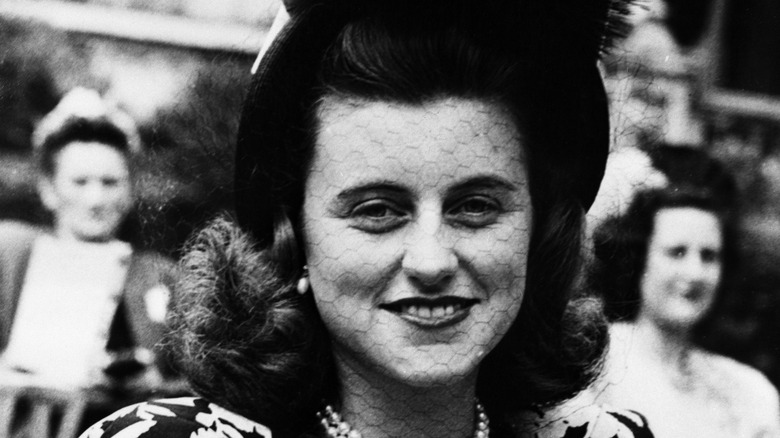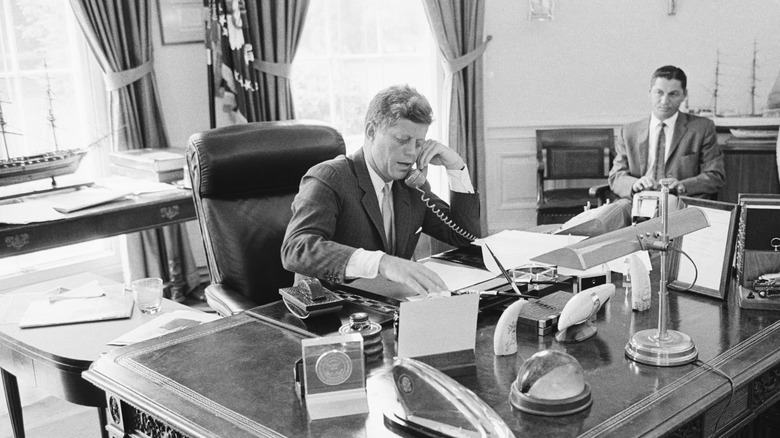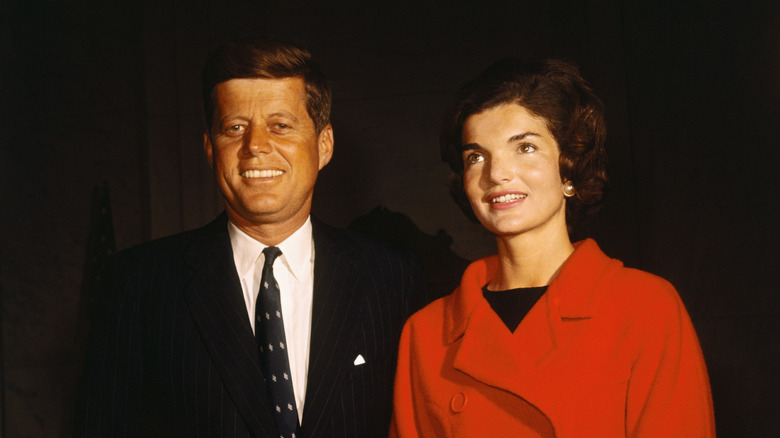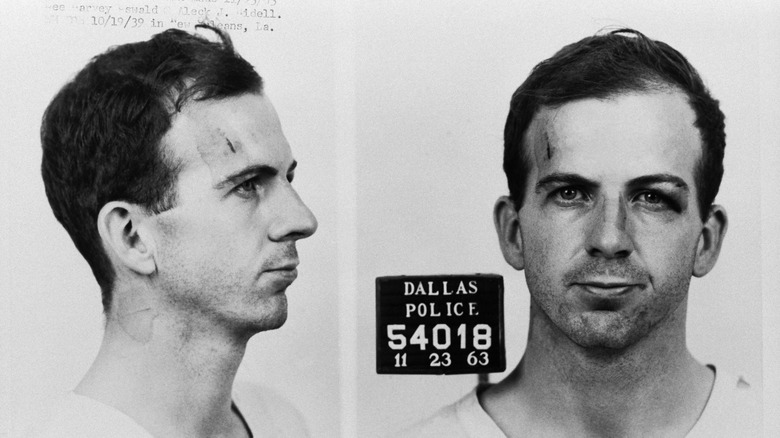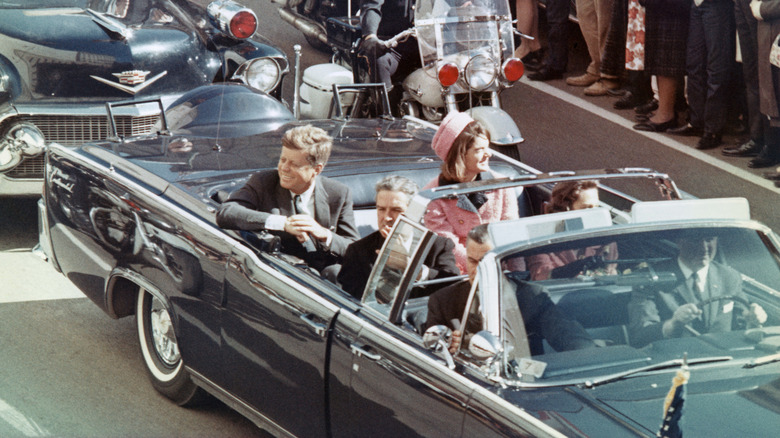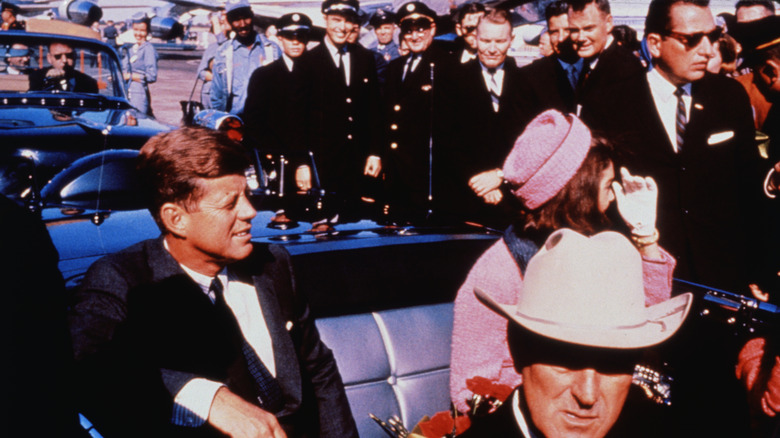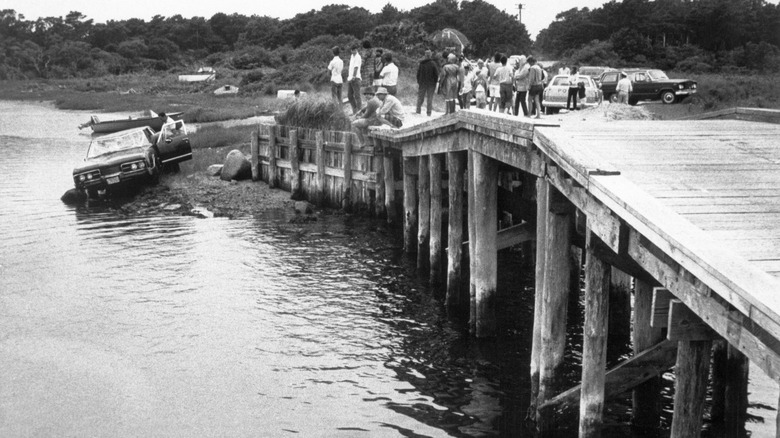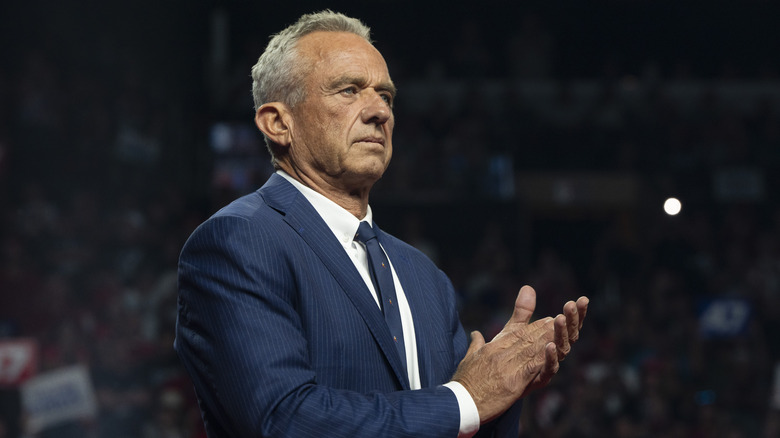Things About The Kennedy Family That Don't Make Sense
When it comes to American history, few families are as scrutinized and deeply embedded in the cultural consciousness as the Kennedys. With one president, three senators, and a slew of other political and societal achievements to the name, it's no exaggeration to say that they're now a modern dynasty of sorts. It all started with Joe Kennedy Sr., whose political machinations began with his own career in the first decades of the 20th century. After he made serious missteps in the lead-up to and early days of World War II, Kennedy transferred his ambitions to his sons, including future president John F. Kennedy. That kicked off generations of power and public life, which all continue to this day.
Yet, for all that attention, there are still some aspects of the Kennedy story that are pretty darn confusing, even decades after the people involved have left the scene. For instance, why was the ambitious Joe Sr. so ready to ditch his political career with some careless words, and why couldn't he sometimes cede control for the good of his children? What exactly happened in 1969 on Chappaquiddick Island in Ted Kennedy's car? Why do so many misconceptions and rumors linger around the family name? What's behind some of the stranger decisions of family members, including RFK Jr.'s championing of conspiracy theories and insistence on running for president despite doubts raised by his own family? These are some of the things about the Kennedy family that still don't make sense.
Why couldn't Joe Kennedy keep from ruining his political career?
It's not like Joe Kennedy Sr. and wife Rose produced three senators by accident. Accounts make it clear that the Kennedys bluntly pushed their sons to take political office. This included funding political campaigns, delivering speeches, building social connections, and even quizzing their children on history and current events at the dinner table. So why was Joe Sr.'s political career such a dud? At first, it had seemed promising. After rising in the business world, he got in good with FDR and was appointed chair of the Securities and Exchange Commission, then head of the Maritime Commission. By 1937, he had become the ambassador to Great Britain.
Then it all came crumbling down. The Kennedys set down in the U.K. just before World War II. With tensions already high, his attempts to connect with German officials were poorly received. So, too, were his later statements advocating for American isolationism as the war began to ravage the rest of the globe. In late 1940, back in America, he dramatically told The Boston Globe that "Democracy is finished in England. It may be here" (via PBS). Soon enough, his personal political ambitions were canned.
The mystery lies in Kennedy's motivations. Surely he understood that his statements were controversial and made for a pretty poor picture, especially as war came to dominate international relations. Why he didn't refine the political art of moderating one's statements (or simply keeping one's mouth shut) remains confusing.
Did Rosemary really need a lobotomy?
When Rosemary Kennedy was born at the family's Brookline, Massachusetts home in 1918, a midwife told mother Rose to delay pushing in order to give the doctor more time to arrive. The infant was likely deprived of oxygen, as indicated by developmental delays. Though Rosemary routinely appeared in public with her family, she also had difficulty reading and writing. Later, as a young adult, she also experienced aggressive moods and seizures.
At first, the Kennedys did what many moneyed families did at the time: they sent Rosemary away. But Rosemary snuck out of the convent she had been sent to and reportedly caroused with men in nearby bars. Her father was horrified and, by 1941, had decided that a lobotomy was the only course of action. At just 23 years old, Rosemary underwent the surgery, in which her brain's frontal lobe was cut off from the rest of the organ. It was meant to make her more tractable. Instead, Rosemary was left unable to walk or talk and was confined to institutions for the rest of her life. Family members occasionally visited her, but almost never spoke about her in public.
But did Rosemary really need brain surgery? In the aftermath of the disastrous procedure, some family members experienced serious regret. Rose, who was never consulted regarding her daughter's procedure, privately referred to the result as a tragedy. Later in the century, lobotomy would fall out of favor and become discredited.
Why was Kathleen Kennedy shunned?
Often known as Kick, Kathleen was the second daughter born to Rose and Joe Kennedy Sr. With her eight siblings, she moved to England when her father became ambassador to Great Britain, though the family returned to the U.S. in 1939 as World War II broke out. After a couple years of more schooling and a brief stint at D.C.'s Times-Herald newspaper, Kick traveled to London to volunteer with the Red Cross. By May 1944, she had married an old friend: William "Billy" Cavendish, the marquess of Hartington.
Now Lady Hartington, Kick became isolated from her family. Only her eldest brother, Joe Jr., attended the simple civil ceremony. The problem: Billy was a Protestant. Meanwhile, the Kennedys were the sort of influential Catholic family who got in pretty close with Pope Pius XII. Mother Rose was reportedly so aghast that she told her daughter hell awaited her (the moralizing becomes all the stranger when you consider the many infidelities of Joe Sr. and other Kennedy men).
When Billy died in action mere months later, Kick was widowed. Years afterward, she began a relationship with another Protestant, Earl Peter Wentworth Fitzwilliam, who was also married. Rose suggested that Kick would be cut off from her family completely. In 1948, just days before Kick was set to speak with Joe Sr. in Paris, she was killed in a plane crash. While her father attended a Mass said for her, none of the Kennedys were at her funeral.
Why did JFK bug the White House?
In 1973, when the public learned of President Richard Nixon's secret White House recording systems, the John F. Kennedy Presidential Library revealed that JFK himself had tapes made of White House conversations during his term. Indeed, all presidents since FDR had done so in one way or another. But it's not entirely clear why JFK began secretly recording White House goings-on. Some in his administration speculated that he had wanted a reliable record for a future memoir. Others wondered if the president, stung by backtracking advisors after the disastrous Bay of Pigs invasion in 1961, wanted something concrete to hold them to their word. But without an explanation from Kennedy himself, we can't be sure exactly why he bugged his own workplace.
Perhaps this seems all the more odd now that we know about tapes made by Nixon, who became the 37th president following Lyndon B. Johnson (Kennedy's own vice president and successor). From early 1971 to July 1973, sound-activated systems set up in a variety of spots — including the Oval Office — recorded an estimated 3,700 hours of conversations. But, while Kennedy may have had his own legacy in mind, Nixon reportedly worried that he would be misrepresented or misquoted and wanted the tapes as a definitive record. Yet these would prove to be part of Nixon's downfall, linking him to the secret-packed Watergate scandal and other instances of misconduct that ultimately pushed him to resign on August 8, 1974.
Why did Jackie stay?
Jacqueline Bouvier probably knew that her husband was never going to be faithful. Both her family and the Kennedys ran in high-powered political and social circles where a faithful husband was a bit of a rarity. Married women, including matriarch Rose Kennedy, attempted to ignore those dalliances.
There are certainly many stories of JFK taking on mistresses, but there is also evidence Jackie wasn't exactly pleased with JFK's infidelity. When Kennedy's long-time friend, Kirk LeMoyne Billings, pulled Jackie aside to delicately inform her of her fiancé's need to remain available to other women, she seemed to assent. But, in an oral history interview, Billings told the JFK Library that Jackie eventually recalled, "When you discussed that with me, I realized all that, and I thought it was a challenge" (via People).
Others allege that Jackie considered divorce, perhaps because of JFK's distant reactions to her miscarriages and a traumatic stillbirth (he was more attentive during the August 1963 death of their newborn son, Patrick). Yet her own family discouraged divorce (in part because the Kennedys were powerful and rich). Joe Sr. allegedly met with Jackie and offered her a significant payout to stay married. But this is an unconfirmed rumor, leaving the question of why Jackie stayed with JFK. It could be that the two had enough money and influence that they could fall back on mutual respect and a shared image to maintain, though neither Jack nor Jackie ever made their motivations clear.
Why did Oswald want to kill JFK anyway?
The details of how JFK met his very sudden and public end are fairly well-known. However, the motivations of his assassin are far less clear and make it easy for some to delve into conspiracy theories.
JFK's presumed killer, Lee Harvey Oswald, experienced a rather tragic childhood (for one, his father died shortly before Oswald was born). This included almost regular upheaval, with Oswald living at more than 20 different addresses and noticing early on that his typically single-parent mother appeared to resent both him, brother Robert, and their half-brother, John. Oswald eventually dropped out of high school and joined the Marines. After three years of service and a discharge, Oswald defected to the Soviet Union in 1959, apparently in an attempt to gain worldwide notoriety. He returned to the U.S. nearly three years later and seemed put out that no one in the news cared. It could be that Oswald's desire for recognition, regardless of how he got it, was behind his April 1963 assassination attempt on Army General Edwin Walker, his subsequent failed effort to travel to communist Cuba or the Soviet Union, and his assassination of JFK later that year.
Maybe JFK, riding in an open vehicle in Dallas, was simply the most famous person that Oswald had easy access to harm. But, given that Oswald was himself assassinated just two days after Kennedy's death, we may never understand his quasi-sensical targeting of a member of the Kennedys.
Why is JFK's brain missing?
In the chaotic aftermath of JFK's assassination, it's understandable that some details would slip by unattended. But when it came out that the president's brain had mysteriously disappeared, things got strange. The generally accepted course of events is that the president's brain was removed shortly after the assassination, during an autopsy at Dallas' Parkland Memorial Hospital. It was then placed in a stainless steel container and given to Secret Service agents, who ferried it to the White House. In 1965, Senator Robert F. Kennedy had it moved to the National Archives. Yet, by 1966, a review of materials related to the Kennedy assassination showed that no such brain was in the archive's possession.
Some used this as fuel for conspiracy, arguing that the brain was hidden away because it would show that another assassin, standing ahead of the president, dealt the killing shot (instead of the official explanation that Lee Harvey Oswald shot from far behind and above JFK).
Others allege that there may be a Kennedy family connection. In "End of Days: The Assassination of John F. Kennedy," James Swanson suggests that Robert F. Kennedy knowingly absconded with the brain. Why? To hide just how ill his brother had been or just how medicated JFK had been at the end of his life. The president did have quite the lengthy list of secret health struggles, but until someone can find that brain, this will remain another strange and confusing story about the Kennedys.
Why are so many ready to believe in Kennedy assassination conspiracies?
When the president of the United States is suddenly and brutally assassinated in front of a crowd, things start to feel chaotic fairly quickly. It's natural that some would turn to conspiracy theory in the aftermath. It's not that the leader of your country was abruptly killed for no real reason; instead, his death was part of a larger secret plan. And perhaps, if you can figure it all out, then the world doesn't contain inexplicable death and chaos that could come for you as easily as it did for Kennedy in 1963. While psychology may be enough to explain the rise of conspiracy theories surrounding the Kennedy assassinations — his younger brother RFK was also shot to death in 1968 and was the subject of subsequent conspiracy thought – it doesn't really satisfy from a logical standpoint.
Perhaps oddest of all is the fact that some Kennedy family members may believe in these conspiracies. At least, we can be certain that RFK Jr. does, as he has publicly expressed doubts over the killings of both his uncle and his own father and has even hinted that perhaps the CIA was involved in JFK's death. He also claimed that his father, RFK, was likewise suspicious of the circumstances surrounding the 1963 assassination of President Kennedy. However, RFK never publicly expressed these thoughts before his own assassination.
The Chappaquiddick incident is confusing
At first, the circumstances of Mary Jo Kopechne's death on Chappaquiddick Island in Massachusetts seem straightforward, if tragic. Late on July 18, 1969, Kopechne — a political aide and speechwriter who had previously worked on Robert F. Kennedy's presidential campaign and was part of the group known as the Boiler Room Girls — was riding in a car driven by RFK's younger brother, Senator Edward Kennedy. The car went off a bridge and into a pond. Kennedy escaped the car. Kopechne didn't.
Kennedy told authorities that he'd attempted to save Kopechne but was defeated by low visibility and a strong current. He then allegedly brought a cousin and another political aide to help, but still failed. Then, Kennedy returned to his hotel without informing the police. He later blamed a concussion and shock for this lapse. Because he waited until 10:00 a.m. the next morning to contact authorities, there was no way to test his blood alcohol level on the previous night. Kennedy was charged with leaving the scene of an accident, received a two-month suspended sentence, and was briefly banned from driving.
Perhaps the most confusing thing about this is the effect the Chappaquiddick incident had on Kennedy's career ... or the effect it didn't have, thanks to the cultural and political acumen of his family. Though Kennedy's hope of becoming president effectively ended, he remained in the Senate for decades, only ending his 47-year career after dying of a brain tumor in 2009.
Why did RFK Jr. run when his own family was so skeptical?
Sometimes, when attempting to do something big, you may find your own family isn't supportive. It could be shortsightedness on their part, but on other occasions, you may wonder if there really is something wrong with what you're doing. So, why did RFK Jr. insist on becoming the fourth Kennedy to run for president when his own family repeatedly — and sometimes very vocally — wouldn't get on board?
Kennedy is a proponent of many an eyebrow-raising conspiracy theory, including his assertion that Sirhan Sirhan didn't kill his father, RFK, in 1968. The official explanation is that Sirhan was the sole shooter (he was given a life sentence and most recently denied parole in 2023).
Criticism from the outside is one thing, but it's more difficult to understand why RFK Jr. continued his campaign when the family was skeptical. Speaking to Vanity Fair reporter Joe Hagan, some Kennedys claimed they privately urged RFK Jr. to drop out. Others publicly supported then-Democratic candidate President Joe Biden. RFK Jr. finally suspended his campaign in August 2024, perhaps capitulating to family pressure. Yet he then endorsed Republican candidate and former president Donald Trump, drawing the ire of family members, including his own sister, Kerry. She signed on to a joint statement that read, in part: "Our brother Bobby's decision to endorse Trump today is a betrayal of the values that our father and our family hold most dear" (via AP News).
